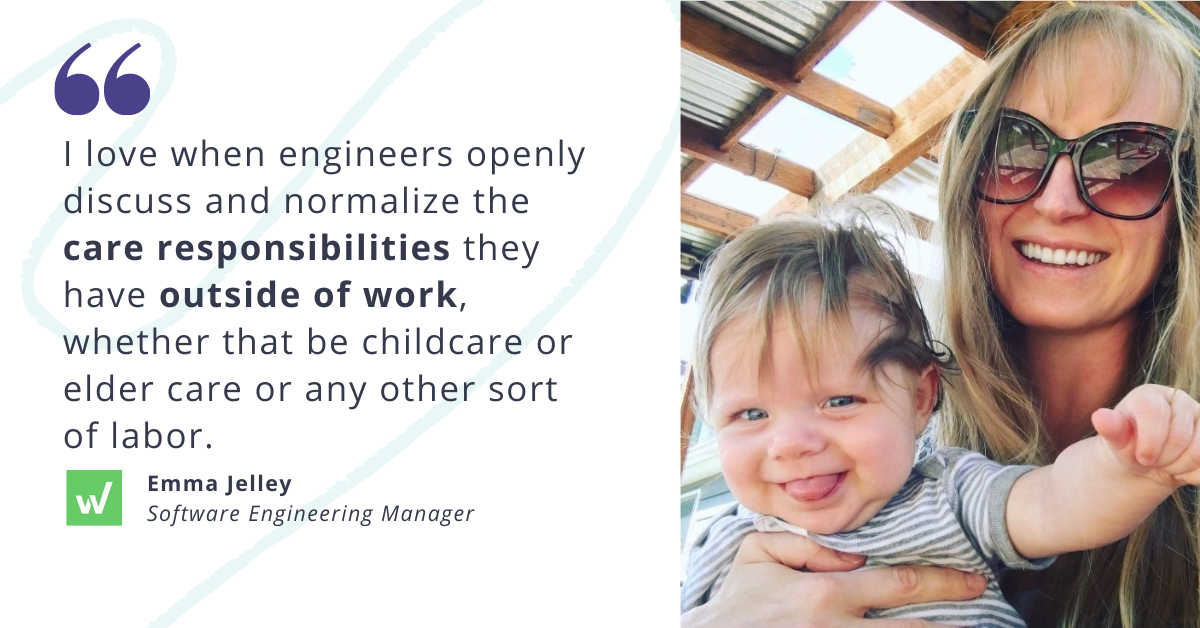Emma Jelley has her college prerequisite classes to thank for the career she now enjoys.
While she’s currently a Software Engineering Manager at Workiva, Emma went to college thinking she would study art or literature. But she took a Programming 101 class to satisfy a STEM requirement, and that’s when she found her passion.
“I was surprised by how much I liked it,” she remembers. “I quickly fell in love, but a bit begrudgingly, because I had prepped most of high school for something very different.”
Emma became living proof that prereqs serve a solid purpose, relishing in the challenge presented by programming. “It was challenging in a way I hadn’t experienced until then, and I really do wish I had come to it sooner. I fell prey to the gender stereotypes that plague STEM and I never seriously considered exploring it before,” she says.
Now, after years of experience as both an individual contributor and a manager on software development teams, Emma shares her knowledge and encourages others to explore STEM by serving as a mentor and counselor for tech camps and Girls Who Code programs.
She was gracious enough to share some of her top hard-earned tips for being a successful engineer with the PowerToFly community — read on for that insight!
Growing as an Engineer and a Manager
Emma’s first job in her field included placement in a technical leadership development program.
“I’ve always been a people-centric person, and I enjoy elements of project management,” she says. “It seemed like it could be a really good fit with my computer science degree.”
But the role didn’t have enough coding for her, so Emma ended up switching to a full-time developer role at another company. It took four years of day in, day out absorption in software development until she was ready to try management again.
“What pulled me back in that direction was seeing the impact some of my favorite engineering managers were able to have on me and my teammates,” she says. “They could see potential before I could see it, and were great advocates for me.”
She set out to become that kind of manager for others… and that’s when she found a posting for an open manager role at Workiva.
“I really liked the way they talked about their culture, and the way that people who worked there were talking about the company. It seemed like there were really cool engineering problems to solve, coupled with a supportive culture,” explains Emma about what inspired her to apply to work at Workiva..
Her Management Values
As an engineering manager, Emma is helping to shape and grow others’ careers just as she had hoped. There are a few pieces of advice that she regularly shares with her team, in line with the approach to management that she’s developed:
- Raising concerns early and often is good. “The earlier something is discussed, the earlier it can be addressed,” she says. “Part of fostering a healthy team is normalizing discussing issues openly. We can't improve things if we don't talk about them.”
- Imposter syndrome is normal, and it can be dealt with. “Recognizing it is such an important first step: there are so many resources, so if you recognize you're dealing with it, you can quickly build a toolkit,” says Emma. She also shared that she struggled with it until she realized how normal it was.
- Your manager doesn’t have a monopoly on career guidance. “Finding a mentor outside of one's immediate team sphere is important,” says Emma. “No matter how supportive your manager is, or your teammates are, sometimes there's just some stuff you'd rather workshop with a more removed, objective third party.”
- There’s a place for institutional knowledge and there’s a place for new ideas and growth. Working at a fast-growing startup can often feel like an overwhelming mix of the tried and true and the new and next, but looking at what’s come before is always a good starting point, says Emma. “It’s important to do your due diligence and explore what resources exist before jumping into new planning.”
4 Qualities That Make for a Great Engineer
Wondering if you have what it takes to succeed as an engineer, whether at Workiva or other tech companies? Emma has a clear set of qualities she’s seen lead to success and fulfillment in her field:
- Flexibility and empathy when it comes to technical disagreement. “When you undoubtedly find yourself at odds with another's technical views, it's really important to genuinely be open to those opposing views during discussion,” she says. “If you entrench yourself really deeply in your own perspective from the start, you're way more likely to miss valuable things others are saying, and even gaps they're highlighting in your plan that you may not have realized.”
- Seeing value in trying new things. “It can be really daunting to step outside of your comfort zone, whether that's in working on a different part of the stack or joining an entirely new team or stretching into a new role of foreign responsibilities. But all of that serves to make one the best contributor they can be,” says Emma. “It allows them to discover their personal strengths, their preferences, their limits, and what they don’t want to do. You have to try things to figure that out.”
- An appreciation for the greater good of the team. “When people are aware of each other’s goals, and are looking out for each other and for opportunities to further those goals, it’s like an all boats rise situation on a team,” she says.
- Openness about non-work responsibilities. “I love when engineers openly discuss and normalize the care responsibilities they have outside of work, whether that be childcare or elder care or any other sort of labor,” she says. As a new mom herself, she’s even more aware now of how important this is: “It's a huge part of people's lives and frequently it just can't be neatly contained outside of working hours. I've been lucky to work at companies where those responsibilities are recognized and supported, not just in word, but day-to-day, with flexibility and formal policies, like solid parental leave policies. The more people acknowledge this type of labor within workplace discussion, the more it will permeate public discourse, and the more it will drive workplace policy widely.”
Good engineering cultures support and encourage those qualities, notes Emma. “Workiva’s values, specifically collaboration, inclusion, and trust, encourage that growth. I’ve seen a lot of rigorous technical discussion and debate and active listening. People have opportunities to move between teams, and are good at sharing experiences and growing together.”




